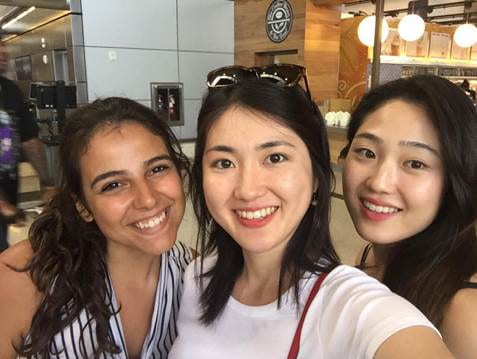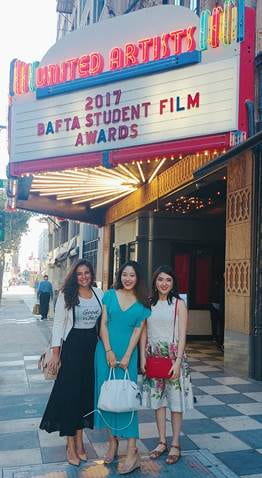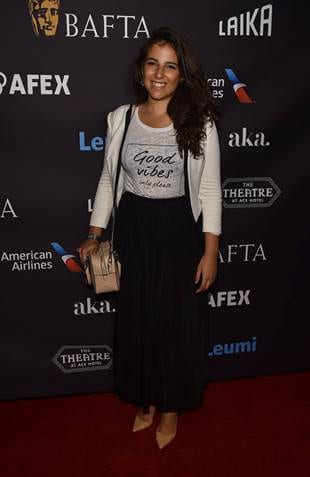The Female Voice @ BAFTA Los Angeles
Julia Dos Santos (BA Media and Communications, 2016) was nominated to win one of four top prizes at the BAFTA Los Angeles Student Film Awards in the documentary category for “The Female Voice”. The documentary was made in collaboration with Minji Kim (BA Media and Communications, 2016) and Jeanette Lee (BA Media and Communications, 2016) as their graduation project.
Watch the trailer for “The Female Voice”:
[youtube https://www.youtube.com/watch?v=cTJZToS4vFI]
Julia has written about her experience at BAFTA LA and offers some final advice for current Goldsmiths student.
As I sat on the Los Angeles-bound airplane at London Heathrow, I could not believe the amazing journey I was about to go on. Who would have known that my final year film would have been nominated as one of the finalists of the LA student BAFTA? Even more unbelievable was the fact that the BAFTA LA had been so generous as to fly me out to the city of angels.
So, there I was. Sitting on a plane, ready to take everything in that happened next. As I spoke to the two women sat beside me, I began speaking to them about my film. One of them was particularly excited – she was a journalist for the Golden Globes. ‘It’s true what they say about LA,’ I thought, ‘everyone is somehow related to the industry’. As I tossed and turned in my airplane seat trying to find a comfortable sitting position, I couldn’t wait to land and meet once again the other components of ‘The Female Voice’ family on our LA adventure.
The Reunion
Landing at LAX on Tuesday night and seeing Minji, who co-produced and did the camera work for the film, and Jeanette, our editor and sound designer, was completely surreal. It had been almost a year since we finished our film and seen each other. We could not have asked for a better reunion. Our first order of business was to drive by the Hollywood sign.

Networking Night
After a long day of sight-seeing with Tracy Bass, who was our documentary tutor and the woman who made it all possible, we headed to The London, a hotel and bar in West Hollywood, where BAFTA LA organised networking drinks for all finalists and BAFTA members. The experience was a whirlwind. We got to meet plenty of interesting people, including people who had worked on blockbuster hits like the Marvel series and The Hunger Games. I was amazed at how friendly and open everyone was and had some interesting conversation with a few people. My favourite encounter of the night was speaking to a wonderful lady about women’s voices and women in the industry. She gave me her card and when I got home I realised I had been speaking to a previous Oscar winner! I couldn’t believe how humble and approachable she had been.
The Big BAFTA Day
 The following day was jam-packed with activities from the morning all the way to the evening. First, we had a coffee and breakfast at the BAFTA LA office where we got to hang out with other finalists, who were all so lovely and international. It was a pleasure to see the mix of young people, each with their own stories, dreams and voices. Then, we had a panel organised by Pinewood Studios with professionals from all areas of the industry, including finance, directing, producing and distribution. They provided us with different insights on the movie business and filmmaking. We then got taken to The Third Floor, a studio born by Lucas film alumni that work with digital visualisation, and helps directors plan out and execute complex scenes, including sequences that require sophisticated CGI work. I’m not sure how much I’m allowed to disclose about the visit, but just take my word that it was freaking cool!
The following day was jam-packed with activities from the morning all the way to the evening. First, we had a coffee and breakfast at the BAFTA LA office where we got to hang out with other finalists, who were all so lovely and international. It was a pleasure to see the mix of young people, each with their own stories, dreams and voices. Then, we had a panel organised by Pinewood Studios with professionals from all areas of the industry, including finance, directing, producing and distribution. They provided us with different insights on the movie business and filmmaking. We then got taken to The Third Floor, a studio born by Lucas film alumni that work with digital visualisation, and helps directors plan out and execute complex scenes, including sequences that require sophisticated CGI work. I’m not sure how much I’m allowed to disclose about the visit, but just take my word that it was freaking cool!
After a quick lunch break, we headed back to the BAFTA LA office where we participated in an animation workshop hosted by Laika Studios. Laika is the masterminds behind films such as Coraline and Paranorman. They work mainly with stop-motion animation, and it was incredible to see up close the animation puppets and the amount of detail and engineering that goes into them to make them come to life on camera. We also found out so much about the behind the scenes process of making a large-scale feature animation and the amount of creativity and innovation required at every step of the way.
We had a few hours of break to get ready for the big event, which was held at the Ace Hotel Theatre in downtown Los Angeles. The venue itself was a piece of Hollywood history – built in 1927 by the United Artists, the film industry powerhouse founded by Mary Pickford, Douglas Fairbanks, Charlie Chaplin and DW Griffith. The theatre was glamorous and elegant, adorned with golden carvings, intricate plaster and metalwork, which adorned its walls and arched ceilings – a true timeless representation of classic Hollywood glamour. There was a drinks reception and finally the ceremony, in which we got to see all of the finalist films. I was extremely impressed with all of the films that were shown – they were all nuanced pieces and interestingly all carried a tense undercurrent, dealing with issues such as mass shootings, refugees and feminism. This made me proud to see that I was in a group of young people with a lot to say to the world.

Finally, after a period of deliberation for the BAFTA members and special Jury, the winners were announced. Even though our film did not win, I was extremely grateful for the experience and proud to have made it that far, having been the youngest director nominated and one of the only undergraduate entrants. I am also incredibly grateful to BAFTA LA, who extended an invitation to all finalists to participate in their alumni networking events and who continue to be incredibly supportive. I have learned so much from the experience, and I’m excited to see how each and every finalist’s filmmaking career develops in the coming years.
Overall, there was also a real sense of complicity between the BAFTA members and us young filmmakers. The feeling I got is that everyone who was involved with the events truly wanted to see new talent succeeding and really was interested in our work. I made some great connections, and have even been in touch with a few of the people I met. For example, the editor I met on the first networking night has sent me a suggestion of a film competition to apply for. It has been very motivating and exciting to see that the bigger fish in the filmmaking pond are willing to help us smaller ones find our stride!
Key Takeaways for a Goldsmiths Student
The BAFTA experience taught me a lot, but this is the advice I would give to other Goldsmiths students in future years:
- Choose documentary: Choosing documentary was one of the best choices I made. Though it’s often considered less “cool” than straight up fiction, documentary can give you a lot of transferable skills because it pushes your creativity and storytelling capabilities. In documentary, you need to learn to tell a compelling story with what you have, and you have much less control. As a result, it gives you the discipline and flexibility to just go out there and “make it work”.
- Take your university work seriously: We got so much out of our graduation film because we put so much into it. At no point did we consider “The Female Voice” as just a university project that we should do in order to pass. We were truly passionate about the topic and committed to telling the story in a compelling way from the beginning. A great film was the end result, not a grade.
- Trust the process: Documentary filmmaking is a process that happens organically. You cannot force things into being, and sometimes you need to be able to let a project become what it has to. “The Female Voice” started out as a completely different film, and it took courage for us to admit that it was not working and to completely erase everything on the timeline and start fresh with time working against us. Had we not allowed the push-pull process of filmmaking to manifest itself, perhaps we would have ended up with a much weaker film. The key takeaway here is to not only be bold and take risks but also to listen to feedback given by tutors and mentors who want to push you to a place that is uncomfortable.
- Push it further: Many great student films go to rest at graduation; however, I would encourage anyone to submit their films into festivals and awards, and communicate and work together with their tutor in order to push it as far as it can go. You never know what might happen, and you will learn a lot from the distribution and festival circuit process itself.
